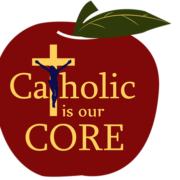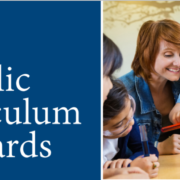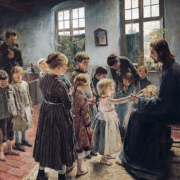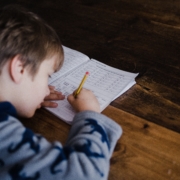Is There Such a Thing as Catholic Math?
Is there a Catholic way of learning something?
Math? Science? History?
It’s an intriguing question. We wrestled with the question this past year at The Cardinal Newman Society, while developing proposed Catholic curriculum standards for Catholic education.
It’s easy to understand that Jesus is the Master Teacher. “Rabbi,” His disciples called Him. A Catholic teacher should emulate Christ and should lead young people to Him.
But saying there’s a Catholic approach to mathematics evokes a vision of Jesus writing in the sand at the Sea of Galilee, attempting to teach pre-calculus to a school of fishermen. Oh, if only Catholics did have a divinely simple method of advanced mathematics! It’s not, at least, in my translation of the Bible.
I’ve never heard a historian suggest that Catholics should learn only about their own experience while neglecting other important world events. Salvation history deserves priority in Catholic education. But within the particular academic discipline of history, studying the Nazi Holocaust is arguably as necessary as studying the Exodus.
I’ve also never heard a scientist suggest that the scientific method works better for Catholics, or that the Old Testament is a textbook for scientific knowledge.
So what’s “Catholic education,” then? Is it a secular education on which we sprinkle prayer, catechesis and Christian values?
The promise seems much larger. Certainly there’s not much point of Catholic standards for curricula in math, history, science and English language arts, if the “education” in Catholic schools is not uniquely Catholic.
The truth is, there is indeed something very special in Catholic education about how and what a student learns. That’s in every subject — not just religion. It doesn’t mean rejecting knowledge that is truthful and worthy of a secular education. But Catholic education has priorities that are uniquely suited to human development and to the needs of the soul, and so our expectations for student learning are always and substantially different … and better!
A Catholic education is evangelical; it is one of the Church’s chief means of teaching the faith and bringing people to Christ. We find God in all things, inside and outside religion class.
A Catholic education is formational; it strives not only to teach useful knowledge and skills, but to prepare the whole person — body, mind and soul — for service to man and God. We want our students to be saints.
A Catholic education is empowering; it teaches students the knowledge and ability to think critically about the world and about human culture, so that our graduates can go forth and help transform family, society, business, government and Church in accord with the Holy Spirit.
Therefore, we expect students to come away from mathematics with something more than a means of engineering and astronomy. By studying math, we want our students to:
- “Demonstrate the mental habits of precise, determined, careful and accurate questioning, inquiry and reasoning.”
- “Respond to the beauty, harmony, proportion, radiance and wholeness present in mathematics.”
- “Recognize how mathematical arguments and processes can be extrapolated to other areas of study, including theology and philosophy.”
- “Propose how mathematical objects or proofs (such as the golden mean, the Fibonacci numbers, the musical scale and geometric proofs) suggest divine origin.”
These are just some of the student outcomes identified by my colleagues, Dr. Dan Guernsey and Dr. Denise Donohue, in developing Catholic curriculum standards. They had help from some of the best minds in the Church, like Fr. Robert Spitzer, S.J., Anthony Esolen, Joseph Pearce and several others.
Such a project, of course, could go on forever and still bear much fruit. But the point is made: there is a uniquely Catholic approach to teaching math and other subjects, because God’s revelation opens up wonderful new ways of looking at the same data and methods. The world is so much more exciting and meaningful, given the gift of faith.
Therefore, science becomes more than the observations obtained by our five senses and “proved” (always uncertainly) by the weight of evidence. Paired with divine revelation, science becomes a means of better knowing God, by the analogy of His creation.
Graduates of Catholic education who study science should be able to, “Demonstrate confidence in human reason and in one’s ability to know the truth about God’s creation and the fundamental intelligibility of the world.” They should, “Relate how the human soul is specifically created by God for each human being, does not evolve from lesser matter, and is not inherited from our parents.”
And at the very least, they should be aware of the great Catholic contributions to science. They should know “Copernicus, Mendel, DaVinci, Bacon, Pasteur, Volta, St. Albert the Great, and others and the witness and evidence they supply against the false claim that Catholicism is not compatible with science.”
Upon learning history, a student from a Catholic school should know “the historical impact of the Catholic Church on human events” and “how Christian social ethics extend to questions of politics, economy, and social institutions and not just personal moral decision-making.”
And every student in Catholic education should have experienced great works of literature! By reading good literature, a student comes to a better understanding of “the proper nature of man, his problems, and his experiences in trying to know and perfect both himself and the world.”
There’s so much more to a Catholic education — indeed as much as completes the perfection of man, which of course is limitless. But unless Catholic families and educators seek answers to the question — What is unique and essential to Catholic education? — we will surely fail to prepare our young people according to the vision of the Church.
After considering all that should be present in Catholic education, the Catholic school or homeschool becomes more exciting and inviting than ever before. If the Church wants a renaissance in Catholic education, faithful Catholic standards are a great starting point.
This article first appeared at The National Catholic Register.

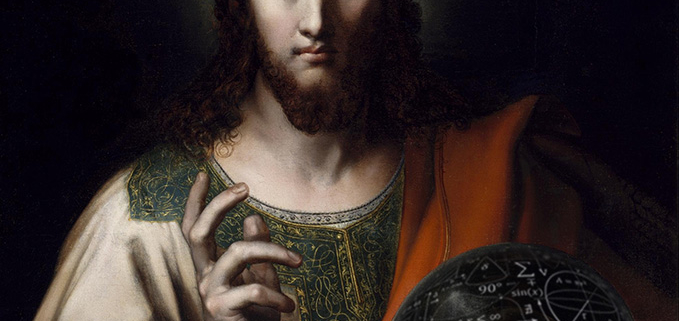
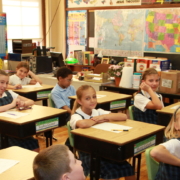 St. Agnes School, St. Paul, MN
St. Agnes School, St. Paul, MN